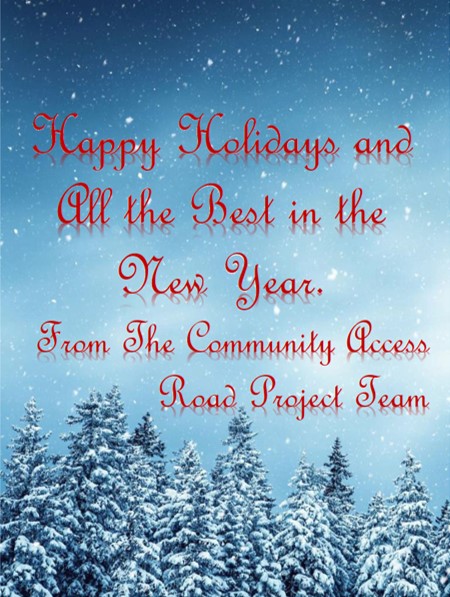Community Access Road Project Update
The intent of our project newsletter is to describe and explain current and ongoing activities by the Marten Falls First Nation (MFFN) Community Access Road (CAR) Project Team, and to answer common questions that come up as the provincial environmental assessment (EA) and federal impact assessment (IA) moves forward.
IA & EA Update
On February 24, 2020, the Impact Assessment (IA) process entered the Impact Statement Phase (ISP). ISP is up to a three-year period where the proponent does baseline studies and assessment work to produce an Impact Statement that will be submitted to the Impact Assessment Agency of Canada (IAAC) for a decision. Currently, we are continuing a Study Plan review process with IAAC and the Ministry of Environment, Conservation and Parks (MECP) experts. The Study Plans provide an outline of what will be studied and how it will be studied and are followed up by Work Plans which outline how the Study Plan was and/or will be carried out.
In Fall 2020, Marten Falls First Nation membership on our distribution list (email or mailing address) got a chance to review the updated EA Terms of Reference (ToR) document in advance of its public release via a password protected website. This website was later made public upon submission of the ToR to MECP. After receiving Chief and Council approval, the CAR Project Team approved the submission of the ToR to MECP. The ToR submission happened on October 23, 2020 and marked the start of a 60-day public review comment period being led by MECP. As required, MECP will provide the CAR Project Team and AECOM with comments or questions that required the proponent to provide a response. This 60-day public review comment period is scheduled to end on December 21, 2020. It is anticipated that MECP will issue a decision early in 2021.
Once a decision is made on the ToR, the provincial (EA) enters its assessment phase and effectively catch up to the IA process that is already in its assessment phase. Once both IA and EA processes are in their respective assessment phases, it will be easier for the CAR Project Team and AECOM to coordinate engagement and review processes. The intent is to create one EA/IA report document to satisfy the federal and provincial regulatory processes.
Study Plans
The CAR Project Team and AECOM have been working through a government review process on the 19 Study Plans developed for the CAR EA and IA. Engagement on the Study Plans (SPs) will occur as part of initial engagement during the EA and IA process.
The Study Plans include:
1. Aboriginal and Treaty Rights and Interests
2. Acoustic Environment (Sound and Vibration)
3. Atmospheric Environment (Air quality changes from road use)
4. Climate Change
5. Cultural Heritage
6. Socio-Community Assessment
7. Economic
8. Land and Resource Use
9. Human Health and Community Safety
10. Physiography, Geology, Terrain and Soils
11. Ground Water
12. Fish and Fish Habitat
13. Surface Water
14. Peatlands
15. Vegetation
16. Wildlife
17. Ungulates (Moose and Caribou)
18. Visual Aesthetics
19. Birds
20. Consultation
More information on SPs in September newsletter. SPs may be added as technical discussions progress.
Study Plans and Then What?
The Study Plans (SPs) describe methodology of how field data will be collected and analyzed. Current, the CAR has 19 Study Plans plus the Consultation Study Plan. The data collection performed in advance of SPs will be used to help refine further areas that require study.
The baseline study reports will describe each valued component identified as important to the proponent. The title of each study plan refers to a valued component and each SPs describes key environmental indicators to be used in the assessment. Environmental indicators are pre-defined ways that the assessment will measure impacts (positive or negative) to the baseline conditions if the Community Access Road is constructed. As baseline reports is being completed, the assessment phase of the EA/IA will begin and operate in parallel.
The EA/IA assessment is a planning tool where AECOM will look indicators from the SPs and think about how the indicators will be impacted if the road is built. Once positive or negative impacts on the indicators are identified work can be done to find ways to avoid or reduce impacts to the environment, which are also known as mitigation measures. All this information is summarized in one report, with baseline study reports attached, that will be designed to meet both the provincial and federal requirements.
We are still in the early days of the environmental assessment. We welcome comments and questions at any time. The next formal engagement events will be when the EA begins and through study programs such as the Indigenous Knowledge Program that has recently kicked off.
Indigenous Knowledge Program
Earlier this year we released a document to First Nations potentially impacted by the project. The Study Area Memo provides information on the local and regional study areas for the Indigenous Knowledge Program. Based on feedback received, the regional study area was expanded, and an updated map was sent to communities.
In November, our Indigenous Knowledge Guidance Document was sent to all First Nations potentially impacted by the project. This document provides guidance, tools, and resources to support Indigenous knowledge collection for the Community Access Road Project. Currently we are working with some communities to advance project specific Indigenous knowledge studies such as starting information sharing agreements. We are strongly encouraging participating First Nations to provide a draft report, which at minimum outlines sensitive areas so that identified sensitive areas can be considered as part of the assessment processes. We are requesting draft reports to be complete by March 2021 and anticipate that First Nations will lead their own studies.

Download the December 2020 Newsletter (PDF 840 KB)
Reach Out
Contact us. Help us correct our distribution list or, to be added leave us a message with your name & contact information and, we will be in touch.

